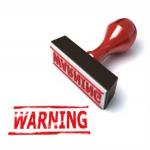Custom Safety Labels are Critical in Providing Consumers the Full Picture of What They're Buying
This entry was posted on July 09, 2020 .

Warning and safety labels are some of the most important types of custom labels. Whether your products are meant for retail sale, used in industrial settings or anything in between, you need to inform people of any associated risks. Some types of goods are more heavily regulated than others, but in all cases, it's a wise decision to focus on clear and comprehensive warning labels.
Providing all pertinent information about your products shows you take safety seriously, which can help build loyalty among your audience.
What Kinds of Products Require Safety Labels?
There are many kinds of products that call for safety labeling before you can sell them. The National Institute of Standards and Technology lists the categories of goods calling for specialized labels and the agencies responsible for upholding the standards. For example, if you're producing goods used by children such as toys or car seats, there are Consumer Safety Product Commission rules to follow. For cosmetics and most food, the U.S. Food and Drug Administration is the relevant agency, except when dealing with meat, poultry, and processed eggs - those are handled by the Department of Agriculture. Tobacco, beer, and spirits are overseen by the Department of Treasury.
Items that may be flammable or potentially hazardous material stored around the household are overseen by the Consumer Product Safety Commission, while goods for workplace use are overseen by the Occupational Safety and Health Administration. In addition to nationwide rules, there are also state-level dictates such as Proposition 65 in California. Products derived from cannabis are regulated at the state level, and rules for such labels are evolving especially quickly.
What Information Should You Include on Safety Labels?
The information needed for safety labels varies as widely as the types of products that require these warnings. For instance, the hazard labels for chemicals required by OSHA's Hazard Communication Standard must have usage instructions and written information about the risks of the substance, along with clarifying pictograms.
For other types of warnings such as Prop 65 labels or the warnings applied to alcohol, the text will reflect the potential risk of using the product. E-cigarettes and related products have relatively new labeling requirements, having recently been classified as falling under the same regulations as other tobacco derivatives. Cannabis, hemp, and cannabidiol (CBD) products may be the most complex category of goods, defined by frequently changing rules at the state level.
What Are The Penalties for Failure to Use Safety Labels?
Without the proper warning and safety labels on products, it is illegal to bring them to market. To ensure you don't have to face an expensive and time-consuming recall or fines and other legal action from government agencies, it's important that you get labeling right on the first try before your products reach store shelves. Working with a label expert partner such as Lightning Labels is a way to improve your safety labeling compliance efforts.
Creating warning labels that alert your products' users to potential danger is one of the most important steps in successfully putting goods on sale. Lightning Labels has helped numerous companies across industries with this process. No matter how specific the requirements associated with your items, custom adhesive labels, and stickers from Lightning Labels can meet those needs.
Request your FREE instant quote today.

 Custom Labels
Custom Labels  Custom Beverage Labels
Custom Beverage Labels  Custom Lip Balm Labels
Custom Lip Balm Labels  Custom Warning & Safety Labels
Custom Warning & Safety Labels  Perfume Bottle Labels
Perfume Bottle Labels  Bumper Stickers
Bumper Stickers  Custom Prop 65 Warning Labels
Custom Prop 65 Warning Labels  Custom Stickers
Custom Stickers